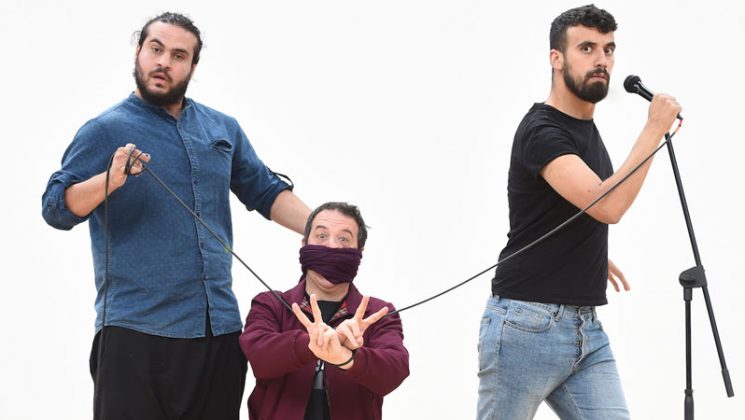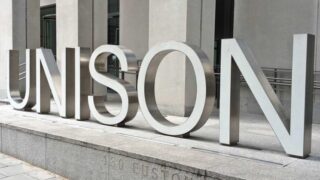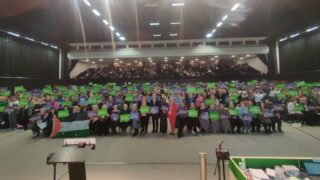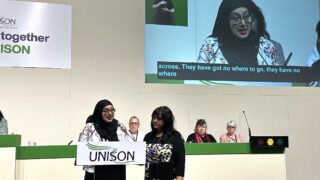Alaa Shehada, Mark Thomas and Faisal Abu Alhayjaa. All images © Lesley Martin 2017.
In 2010 Mark Thomas, Britain’s best-known political comedian, was walking the length of Israel’s controversial separation wall, the illegal barrier that cuts an oppressive swathe through the West Bank, when he decided to take a detour to the Jenin Refugee Camp. He’d been told of an unlikely theatre – in the heart of the camp – and couldn’t resist checking it out.
“It was one of the most exciting places I’d ever come across,” he recalls now. “Look, I’m all about trying to create theatre and events that reach out and are relevant to people’s lives. So when you go to a place like Jenin and you see a theatre like this, which has a relationship that’s always in flux with the camp, which puts on shows that remind people of their story, their history, it’s absolutely thrilling.”
The northernmost refugee camp in the West Bank, Jenin was established in 1953 and has around 14,000 inhabitants. According to the United Nations Relief and Works Agency (UNRWA), Jenin experiences one of the highest rates of unemployment and poverty among the 19 West Bank refugee camps. Many residents previously relied on work in Israel, which has been severely restricted since the construction of the barrier.
The UNRWA adds that ‘protection issues’ remain a primary concern for residents. Both Israeli and Palestinian security forces conduct regular operations in the camp that often result in clashes and violence. Refugees have been killed during these operations. The violence has also had a significant impact on the emotional and psychological well-being of young children.
Sitting within its own compound inside the camp, The Freedom Theatre was founded in 2006, as a community project, compete with theatre school, open to all but particularly the young, for whom it aims to provide “an important set of tools for dealing with the hardships of daily life under occupation.”
Its first performance was an adaptation of Orwell’s Animal Farm. Another, The Siege, which the Freedom Theatre brought to the UK, dealt with the siege of the Church of Nativity in Bethlehem during the second intifada.
In 2010 Mark met the theatre’s director Juliano Mer-Khamis, a well-known Israeli-Palestinian actor. “I found him really charismatic, and his ideas were incredibly exciting,” he recalls.”Juliano talked about raising the leaders of a non-violent intifada, where human rights, not a flag, were the most important thing.”
Faisal Abu Alhayjaa, who was one of Mer-Khamis’s students, adds: “We try to explore the theme of cultural resistance, because we believe the occupation is not only the wall and the physical occupation, but there is a more dangerous occupation, which is in the mind. So I believe we liberate the mind, we liberate the land.”
Unfortunately, even art and culture can be seen as threatening to extremists. In 2011, Juliano Mer-Khamis was assassinated, shot in front of his theatre. The killer remains unknown, but Faisal is clear about one thing: “At The Freedom Theatre we’re talking about Israeli occupation, about community, religion, traditional roles. The killer of Juliano for me is the one who was against our freedom to do that.”
Today we’re talking thousands of miles and a world apart from Jenin, in the rehearsal space of the historic Theatre Royal Stratford East in London, the location of some radical theatre of its own, notably in the 1950s when the legendary Joan Littlewood championed her “people’s theatre”.
Mark, Faisal and another Freedom Theatre actor Alaa Shehada are preparing Showtime from the Frontline, shortly before touring the UK. Thomas says of his work generally that, “I go off and do something, and then come home and write shows about it.” So in 2011 there was the Walking the Wall tour. And the new show is about his decision to return to Jenin and school a dozen Palestinians in the art of stand-up. Or as he puts it: “To fight for freedom of expression in a place that doesn’t have much freedom.”

That was in 2015, when Mark and his friend Sam Beale, who teaches stand-up at Middlesex University, devised a course of workshops specifically for Jenin. Some of their students were already involved in the Freedom Theatre, others had never performed before; none had done stand-up. The result was Comedy Club, two nights of comedy featuring their brand new routines.
The Brits were clear about two things: that teachers from the Freedom Theatre should attend the workshops, so they could continue to train others; and that the workshops would include women, in keeping with the theatre’s policy – controversial to some in the community – to encourage more women on stage. After the success of Comedy Club, Mark says, “There are all sorts of possibilities about what happens long term.”
The stand-up routines in Jenin were not necessarily political. “The whole point was that here’s a group of 12 people, with 12 individual experiences, who share some of those experiences. They’ve got their own voice. Some people wrote material that is very much about camps and the occupation, other people wrote material that was about boyfriends or girlfriends. And if it’s a woman talking, that takes it into a whole other dimension of politics.”
Adds Alaa: “I think the positive thing of Mark’s workshop was that it encouraged us to think more about ourselves as people, as having friends, families, living in a society, thinking more about our daily life. To go deeper into ourselves, and find the comedy there.”
Mark himself didn’t take part. “Yeah, my Arabic is fantastic,” he says ironically, before more seriously: “It’s about them, not me.” Faisal and Alaa did perform. And they will be reprising their routines, this time in English, for the UK show.
Clowning, no laughing matter
Naturally, none of the three want to give spoilers about the content of Showtime from the Frontline, though our chat is littered with examples of the absurdity of repression.
For example, the impossibility of work in Israel.
“There are still some people from Jenin who work in Israel, but not as many as used to be,” says Faisal. “They have this permission system. You have to get permission to go inside, you have to get permission to work. You have to be married, you have to have kids, you have to be 40 if you’re not married. There are a lot of details. Big drama. It’s easier for me to come to the UK than to get the permission from the Israelis.”
And then just travelling, anywhere, in the West Bank is both difficult, humiliating and dangerous.
“It’s an apartheid system,” says Alaa. “There are streets just for settlers, and other streets for Palestinians where it takes hours to reach where you need to go.
“There is a checkpoint, Kalandia, between Ramallah and Jerusalem. Always traffic. You suffer a lot, just to pass through, just to start your day and to lead your life. You see stress in the air all the time. They can stop you at any time – take off your shoes, your t-shirt, your trousers.
“Me and my friend had a clown workshop in Bethlehem. We were driving back in the evening, it was dark, and suddenly we were stopped. Twenty soldiers, three tanks. The main soldier came to us and asks my friend, who is at the wheel, ‘Who’s the driver?’ My friend said ‘Me, I’m the driver’. The soldier says, ‘No, who’s driving?’ Then he looks at me. ‘What’s your connection?’ ‘We are friends.’ ‘Where is the gun?’
“We passed through. But I thought at any moment I would be killed.”
Adds Faisal: “At checkpoints, you’re worried if you’re going to sneeze.”
UNISON’s work in Palestine
The union is supporting local projects to:
- organise Palestinian workers in the Israeli industrial zones in the West Bank
- educate agricultural workers on settlement farms in the Jordan Valley about their rights, and support them in claims for the minimum wage and other rights under Israeli law
- organise and represent Palestinian women in East Jerusalem, in accessing social benefits and employment
- education trade union activists and potential leaders
- defend and educate Palestinian women employed on the settlements on their labour rights.
The laughter amongst the three of them, led by Mark’s contagious cackle, suggest how easily they will be finding humour in their material.
The trio observe that freedom of speech is compromised ‘on all sides’, whether it’s Israel clamping down on anyone advocating boycott divestment and sanctions, or the Palestinian National Authority’s sensitivity to public comments about its leadership.
Mark is about to give an example and says to the others, “If you guys stood up in Israel and talked about the boycott….” But he is interrupted. “We’d have to get in first.”
Of course someone who’s very free with his views is the president of the United States. “Man oh man, where do you start?” sighs Mark. “We’re going to recognise Arkansas as the capital of America.”
Challenging preconceptions
Thomas says that he doesn’t know anyone from the West who has visited Palestine and “not been gripped by the injustice”.
But he also counters the notion that his shows are preaching to the converted. “A lot of people assume that the audiences in my shows hold the same views as me. Some do, some don’t. The idea that everyone is a liberal or a leftie is just not true.” In any case, he observes, “Theatre works on empathy, it’s about feeling things, about identifying with other people.”
He is hoping that the new show will challenge people’s preconceptions of what a refugee is, what people want with their lives, what their aspirations are. “I think that’s very important. The idea that a refugee is just someone who sits around with a begging bowl is fucking stupid.”
Showtime from the Frontline is on tour throughout the UK until April. And Faisal and Alaa’s stand-up adventure faces a new challenge. “If it was in Arabic we would be more comfortable,” admits Faisal. “But we’re looking forward to it. And I promise you, they will laugh so much.”




